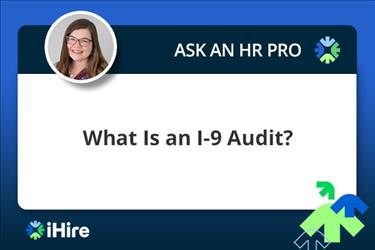- Employer Resources
- |
- Last Updated: May 20, 2025

Fake Candidates Are Getting Smarter. Here’s How to Stay Ahead
The rise of remote work has given employers unprecedented access to global talent pools. Unfortunately, it’s also given bad actors access to the same employers. This has given rise to a trend you can’t afford to ignore: Fake job applicants are using AI to cheat the system.
Fake candidates don’t always look suspicious at first glance. They apply with impressively clean, professional resumes and confidently say all the right things during remote interviews. But beneath the surface, these prospective employees often hide fake identities, bogus credentials, or other people entirely. Sometimes, they also conceal malicious intent.
Here’s what you need to know to spot a fake job application before it becomes a danger to your company or worse.
What’s Driving the Fake Candidate Scam
AI has made impersonating qualified candidates all too easy for fraudsters with a little time and technical ability. Tools that generate ready-made false resumes, write compelling cover letters, and even simulate human conversation have lowered the entry barrier. Combining generative AI and web scraping tools enables scammers to apply for hundreds of jobs daily. They can even automatically fine-tune each application to match specific roles.
Some take this concept even further. With deepfake video imagery and voice cloning technologies, fraudsters can impersonate real people during remote interviews. AI chatbots can generate convincing answers to technical or behavioral questions in real time. Some scammers rehearse with AI-generated answers, while others rely on remote collaborators feeding them prompts during video calls.
Once you hire a fake candidate, they can quietly subcontract the work, install malware within your company’s core software, or vanish after collecting their first paycheck. For some, the goal is easy money. Others want access to internal systems or sensitive data. Some even collect job offers and sell company logins on the black market.
Why It’s Risky to Ignore the Signs
Falling for a fake candidate scam can open the door to serious, not to mention expensive, problems. A scammer with access to internal systems or customer data can cause real damage. Even if they’re only outsourcing their tasks, the result is the same: your team ends up relying on someone who isn’t who they claimed to be.
Some companies don’t realize they’ve been duped until a project falls apart or sensitive files go missing. Others waste weeks onboarding someone who disappears after payday. In the worst cases, the hired scammer installs ransomware, gains control of essential systems, and demands payment from the company.
It Gets Worse
The issue can be a headache for your business, but even more alarmingly, it can pose a legitimate national security threat. In late 2023, U.S. authorities charged several individuals with using stolen identities to apply for remote jobs, then secretly outsourcing the work overseas. In one case, a U.S. citizen helped North Korea funnel income into its nuclear weapons program by placing remote workers in unsuspecting American companies.
The Department of Justice has documented over 1,000 fake job applications linked to criminal networks and state-sponsored actors. According to a CNBC report, these scams often involve identity theft, payroll fraud, or extortion.

How to Spot a Fake Job Application
A strong resume and a well-polished interview aren’t enough to confirm an applicant’s legitimacy. To spot a fake candidate, look beyond the surface level and examine details closely. Remember, patterns matter. One oddity might merely indicate a nervous or inexperienced applicant, but several stacked up should raise concerns.
Resume Red Flags
Inconsistent employment dates, vague job descriptions, or unverifiable credentials are common. Watch for resumes stuffed with buzzwords but light on specifics.
Online Presence Mismatch
Cross-check names, employers, and timelines with online profiles. If a candidate has no digital footprint, or if the footprint doesn’t match their resume, that’s a warning sign.
Too-Slick Interviews
Scammers often rehearse with AI-generated answers, so they’re ready with fast, polished replies – but only when you ask expected questions. If they stumble during follow-ups or struggle with unscripted scenarios, press further.
Glitchy Video Calls
If the candidate’s face freezes when they speak or their lips don’t sync with the audio, you could be looking at a deepfake or an AI persona. Audio delays and strange lighting or shadows may also suggest voice or video manipulation.
Third-Party Involvement
Some fake candidates ask to reschedule interviews at odd hours or claim to need assistance setting up remote tools. Others try to loop in “helpers” or “project managers.” That’s not normal.
Connect With Qualified, Career-Driven Talent in Your Industry
Create your free account to get started.

We Value Your Privacy
Tips to Avoid Hiring a Fake Candidate
Even the best employment prescreening process can let a scammer slip through. Still, implementing a few simple changes can lower your company’s odds of getting snared by a fake candidate scam.
Use Verified Platforms
Stick with known, reputable job boards and applicant tracking systems that require identity checks. Avoid open-call forums where applications are harder to trace.
Add Authentication Steps
Before interviews, ask candidates to submit a short video introducing themselves. During interviews, verify that the person on the screen matches their ID, especially for remote roles.
Test in Real Time
Don’t rely solely on resumes or pre-written portfolios. Assign a short, live task during the interview or follow up with a timed skills test. It’s harder to fake results on the spot.
Watch for Coaching Setups
Ask follow-up questions mid-answer to interrupt canned replies. If someone’s being fed lines through an earpiece or chat window, they’ll usually hesitate or slip up.
Verify References and Credentials
Call listed references directly. Confirm the candidate’s licenses and certifications. Use official sources to verify education history. Run background checks. Many scams collapse under basic fact-checking.
Don’t Fall for Fake Candidates
Fake job applicants aren’t looking for work; they’re looking for access. If your hiring process doesn’t catch them early, you’ll pay for it later with time, money, or worse. Every company that hires remotely is a potential target. That doesn’t mean you need to stop hiring remote workers. It means your screening process needs to catch up with the increasingly sophisticated tools scammers are using to slip through the cracks.
Vet thoroughly. Trust cautiously. And if something feels off, don’t ignore it.
For more hiring advice and other tips, check out iHire’s Resource Center for employers.
RELATED RESOURCES
Hiring? You're in the Right Place.
- Reach unique talent: 51% of our candidates aren't using other job boards
- Connect your ATS and get 6x more applications with iHire's apply process
- Get matching candidate resumes sent straight to your inbox
We Value Your Privacy


![Skills Over Degrees: The Future of Hiring [Video Webinar]](https://p-gpb8fhd4b9fbh6fy.z01.azurefd.net/cms/2f6c3996-55d2-41a7-92cd-801a93177d31/4adbd698-ab4c-4e81-9823-8c8cfade1f76-md.png)

